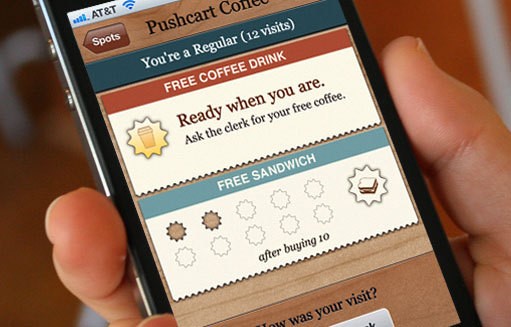Editor’s Note: This article was originally published by Web Marketing Today. Practical Ecommerce acquired Web Marketing Today in 2012. In 2016, we merged the two sites, leaving Practical Ecommerce as the successor.
Beacons, a new technology designed to drive customer loyalty and in-store sales, is growing in popularity among larger retailers. But is it something smaller retailers can use?
This article addresses that question, provides details about beacons, and lists five possible reasons local businesses may want to employ the technology.
What Are Beacons?
Beacons are small, Bluetooth-enabled devices that attach to a wall or countertop inside a store. Beacons are proximity-based, meaning they send Bluetooth signals to a customer’s smartphone once she is within 50-100 feet of the device, automatically triggering personalized coupons, special offers, and loyalty rewards. Typically, one beacon is needed for every 5,000 square feet of store space.
Examples of beacons from various manufacturers. (Source: FutureOfPrivacy.org)
Beacons can also enable contactless payments, which speed up the checkout process. The devices use batteries but rely on Bluetooth’s low-energy requirements to provide longevity.
Large retailers like Macy’s, Target, and Urban Outfitters began experimenting with beacons this year and the trend is catching on with many others.
Smaller retailers have yet to make use of beacons for the most part, but that could change, based on factors that include their low cost, relative ease of implementation, and growing consumer preference toward the use of mobile phones while in stores — a practice known as “showrooming.”
How Much Do Beacons Cost?
The cost of beacon devices varies but is negligible in most cases. One provider, Swarm (acquired by Groupon in 2014), offers them for about $80. I’ve found them listed elsewhere for $40, or even less.
Retailers must also have a beacon-enabled mobile app, which could cost thousands of dollars to develop. However, companies like Collect Rewards and Swarm offer out-of-the-box apps for as little as $29 per month. Collect Rewards also offers point-of-sale integration with certain providers, enabling retailers to gather customer transaction data.
First Data, a point-of-sale technology provider, has a loyalty app called Perka that also integrates beacon technology with its POS system. Merchants collect customer data and reward customers with loyalty points each time they check in. The program costs less than $40 per month per location, and First Data provides beacons at no cost to Perka users.

Perka beacons integrate with its customer loyalty rewards app.
Use Facebook Beacons Free of Charge
In its attempt to be all things to all people, Facebook now offers beacon technology at no cost to retailers who have Facebook pages.
The platform lacks the ability to provide personalized, targeted offers. Instead, it uses “Place Tips” (a feature that shows users information about the places they visit) to send information to customers who have the Facebook mobile app open on their phones.
Customers who use Facebook at the store will see the following:
- A welcome note and photo;
- Prompts to like your Facebook page and check in;
- Posts from your page;
- Their friends’ recommendations about your business.
Facebook’s beacon device is super-simple to set up. Just pull it out of the package, peel off the sticker, and place it in a central area in the store.
It’s a bit more complicated for users, however. For the device to work, customers must have an iPhone 4S or later with Bluetooth turned on, the latest version of the Facebook for iOS app, location services on their device turned on for Facebook, and place tips enabled in the app.
Facebook beacons are designed to be active only at the address associated with your Facebook page and will turn off place tips if you set up your beacon in a different location.
Visit the beacons page to request a device. Beacons are currently being distributed to a limited number of businesses, but it never hurts to get your name in the hat when more become available.
Reasons to Use Beacons
I can see five reasons small retailers should consider using beacon technology.
- Customer convenience. Since consumers use their mobile apps to comparison shop while in the store, it makes sense to divert their attention away from competitors like Amazon and Walmart by triggering an offer at the moment when they likely have purchase intent. Even if they are not checking out other retailers, your cusomters will appreciate receiving a discount or loyalty reward.
- Enhance shopping experience. “A store has got to be much more than a place to acquire merchandise,” said Ron Johnson, former CEO of J.C. Penney, in an article at Harvard Business Review. “It’s got to help people enrich their lives.” To his way of thinking, merchants need to move away from a transaction mindset to one focused on enhancing the shopping experience, giving customers more than they expect. Beacons do that by providing personalized coupons, offers, and rewards.
- Affordability. The low-cost (or, in Facebook’s case, free) use of beacon technology makes it affordable for most any small business.
- Compete with large retailers. Typically, technologies like beacon are something only larger retailers can afford. Your ability to use them helps level the playing field.
- Customer intelligence. Beacon-enabled apps collect data on customers’ spending habits and product preferences, enabling you to create more personalized, targeted offers.
Wrap Up
Some have suggested that, due to its association with the “Internet of Things,” use of beacon technology could revolutionize in-store retail. That remains to be seen, of course, but the growing trend toward consumer use of mobile phones to comparison shop while in the store may drive its adoption.
Forward-thinking small businesses, faced with competition from their big-box counterparts as well as other main street businesses, may want to experiment with beacon technology, due to its low-cost.


